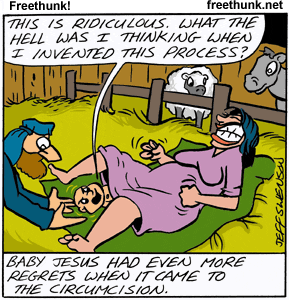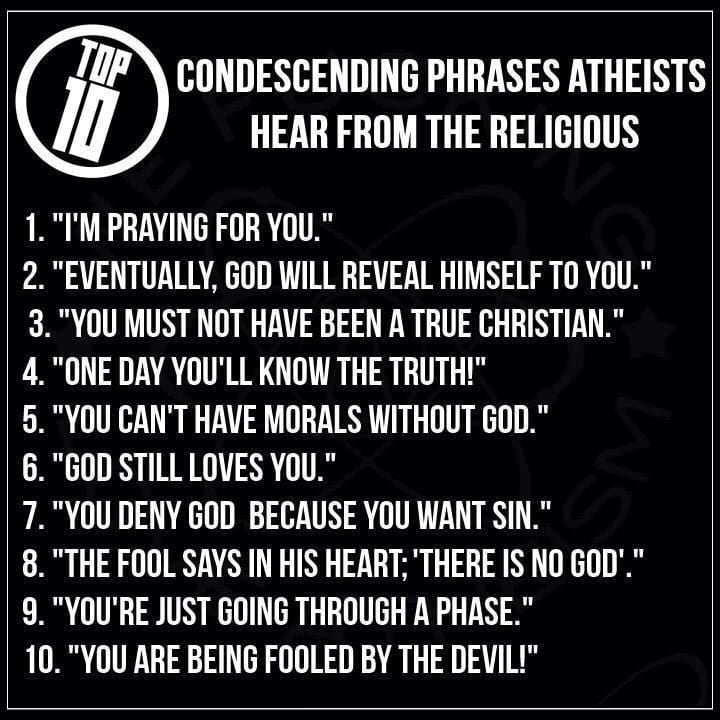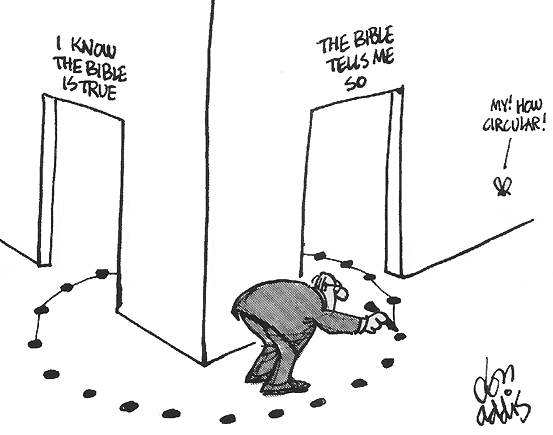The Black Collar Crime Series — which details the criminal behavior of pastors, evangelists, missionaries, and other Christian leaders — draws a lot of vitriol from Evangelicals who believe there is some sort of “atheist agenda” behind these stories.
Several years ago, a self-righteous, indignant Evangelical took issue with my posts on Pastor Raymond Vliet (please see Black Collar Crime: Evangelical Pastor Raymond Vliet Pleads No Contest to Attempted Embezzlement). Here’s part of what he had to say:
Do you believe in truth in reporting? I would think putting your name on this article you would have some integrity. did you investigate any of this information you posted or are you just here to Bash any Pastor to push your atheism?
….
If you want the truth and you want to prove email me we will send you all you need to know the print the truth. Unless of course you’re not interested in the truth the Constitution gives you the right of free speech Integrity gives you the right of Truth in free speech.
This man suggests that I have some sort of “atheist” agenda driving my exposure of his pastor as a thief. He provided no evidence that my post was false or misleading. Instead, he accuses me of going after his pastor for nefarious reasons — as he does the sheriff and prosecutor in the case.
Let me state, once again, WHY I write the Black Collar Crime series:
The Black Collar Crime series is in its fourth year, having published almost eight hundred reports of clergy and church leader criminal misconduct. Using Google Alerts, I receive an immediate notice any time a news story about clerical malfeasance is posted on the internet. It is important that these stories receive wide circulation. Victims need to know that there are people standing with them as they bring to light that which God’s servants have done in secret.
I realize that these reports are often dark and depressing, but the only way to dispel darkness is to turn on the lights. Clergy who prey on congregants — especially children — must be exposed, prosecuted, convicted, and sent to prison. By leveraging this blog’s traffic and publishing these reports, I am serving notice to law enforcement, prosecutors, and judges: we are paying attention, and if you fail to provide justice for victims, we will hold you accountable.
Sadly, many clerics have enormous power over people. How else do we explain that alleged repeat abusers of children and sexual predators such as Lester Roloff, Jack Patterson, Bob Gray, David Hyles, and Mack Ford — to name a few — never spent a day in jail for their crimes? Mack Ford, in particular, spent decades physically and psychologically destroying teenagers, yet, thanks to his connections in the community, he was never prosecuted for his crimes. (Please see Sexual Abuse in the Name of God: New Bethany Home for Girls, Teen Group Homes: Dear IFB Pastor, It’s Time for You to Atone for Your Sin, What Should We Do When Religious Freedom Leads to Child Abuse?)
Sometimes, these seemingly untouchable predators are brought to justice, but not until the public puts pressure on law enforcement and prosecutors, forcing them to act. The sordid story of abuse at Restoration Youth Academy is case in point. Decades of reports about abuse were filed with local law enforcement, yet nothing was done. Yes, they finally acted and the perpetrators are now in prison, but what do we say to the hundreds of children and teenagers who were ritually abused before prosecutors got around to doing their job?
I am sure that this series will bring criticism from Evangelical zealots, reminding me that accused/charged clerics are innocent until proven guilty. While they are correct, all I am doing is sharing that which is widely reported in the news. In the twelve years I’ve been writing about clergy misconduct, I can count on one hand the number of pastors/priests/religious leaders who were falsely accused — less than five, out of hundreds and hundreds of cases. The reason for so few false accusations is that no person in his or her right mind would mendaciously accuse a pastor of sexual misconduct. The social and personal cost is simply too high for someone to falsely accuse a religious leader of criminal conduct.
People often believe that “men of God” would never, ever commit such crimes. One common thread in the crimes committed by Jack Schaap, Bill Wininger, Josh Duggar, David Farren, Naasón Joaquín García, and a cast of thousands, is that family and fellow Christians were absolutely CERTAIN that these men of God could/would never commit the crimes with which they were charged. Even when presented with overwhelming evidence, their supporters — with heads in the sand — refuse to believe that these servants of Jesus did the perverse things they are accused of. (Please see What One IFB Apologist Thinks of People Who Claim They Were Abused and Evangelicals Use ‘We Are All Sinners’ Argument to Justify Sexual Abuse.)
Secondary reasons for this series have to do with exposing the lie that Evangelicalism is immune to scandal and criminal behavior. I remember when the Catholic sex scandals came to light. With great glee and satisfaction, Evangelical preachers railed against predator priests and the Catholic Church who covered up their crimes. Now, of course, we know — with the recent Independent Fundamentalist Baptist (IFB) and Southern Baptist sex scandals — that Evangelicalism is just as rotten, having its own problem with sexual abuse and subsequent cover-ups. Evangelicals love to take the high moral ground, giving the perception that their shit doesn’t stink. Well, now we know better. Not only does Evangelicalism have a sexual abuse problem, it also has a big problem with pastors who can’t keep their pants zipped up. (Please see Is Clergy Sexual Infidelity Rare?)
I receive threats from people defending their religious heroes. Threats of legal action are common, even though all I am doing is republishing stories publicly reported by news agencies. A pastor featured in one of my reports contacted me and said that reporters had it all wrong. As I do with everyone who asserts they are being falsely accused, I told this preacher that he could give his version of the facts, sign his name to it, and I would gladly add it to the post. Usually, this puts an end to any further protestations. Most often, the accused want to bully me into taking down my post. In this preacher’s case, he provided me his version of events and I gladly added it to my post. After adding the information, I decided to investigate this pastor further. I found more information about his past indiscretions and crimes. I dutifully added them to the post. I have not heard anything further from the good pastor.
I am not immune from making mistakes, so if you spot a factual error in one of the stories, please let me know and I will gladly correct it. If you come across a story that you would like me to add to this series, please use the contact form to email me. Please keep in mind that I need links to actual news reports in order to add them to this series.
My godless friend Brian Vanderlip — who happens to have advanced degrees in sarcasm, snark, and humor — asked me the following question:
I am interested, Mr. Gerencser, in understanding your ‘atheist agenda’, the one you are trying so hard to ‘further’ by publishing false stories about preachers. I keep hearing this ‘idea’ from Christians, how atheists want to turn the world into a moral and ethical cesspool, how they are involved in cultic practices, have sex with and eat babies and so forth.
I have not been able to verify this oft-repeated meme and wonder if you might, as a known perpetrator of atheism, reveal to me your ‘agenda’. Over time, it seems to me that non-believers simply don’t believe in God(s) but often say they are open to being provided proofs and that should these proofs stand scientific scrutiny, they are more than willing to change their position. Christians, on the other hand, firmly knowing their Saviour, actively shout protests when anybody offers them information that is not approved by their local pastor, their Christian club.
So, please, please, Mr. Gerencser, if you would be so kind, explain just what the atheist agenda is, pretty please?
Brian’s question gives me the opportunity to address the notion that atheists with public voices as writers and speakers, have some sort of “agenda.” While I can’t speak for all atheists, nor can I address the motivations of individual atheists, I can speak about my motivations, and what, if any, agenda drives my writing — particularly the Black Collar Crime Series.
Most Evangelicals, preachers included, make all sorts of false assumptions about atheism in general and atheists in particular:
- Atheism is a religion.
- Atheists hate God.
- Atheists want to destroy Christianity.
- Atheists are deliberately ignorant, refusing to see the “truth” revealed in God’s inspired, inerrant, infallible Word.
- Atheists worship humans.
- Atheists secretly desire to engage in sin, especially sexual sins.
I am sure there are more things I could add to this list. While some of these things might be true about certain atheists, I can categorically state atheism is not a religion, and most atheists don’t hate God, want to destroy Christianity, live in “denial” to the truth of God’s Word, worship humans, or secretly desire to engage in sexual “sin.” These claims are assumptions made by Evangelicals without any credible evidence to prove their veracity. I have written about these claims several times over the years. None of them is true. Instead of engaging atheists on their own terms, fairly and honestly, Evangelicals construct a strawman, which they then gleefully burn to the ground. What Evangelicals fail to understand is that what they have torched bears no resemblance to atheism and atheists. Sorry, but we are not the awful, vile, evil people you think we are. In fact, I would argue that atheists — who generally are humanists — are moral, ethical people who promote and value love, kindness, and goodness. Simply put, Evangelicals, just cuz you say it, doesn’t make it so.
Every atheist writer I know is a free agent. We don’t check in with the Freedom From Religion Foundation, American Atheists, American Humanist Association, or Atheist Pope Matt Dillahunty before we write on a particular subject. Some atheists don’t particularly like my writing. I have been accused of being too soft on Christianity. Atheist mythicists don’t like the fact that I believe Jesus was a real person. And atheist libertarians? Why they can be downright vicious, despising my liberal/socialist political views. The other day, we had a mother cat and four kittens eating at Gerencser Buffet for Feral Cats, Possums, and Racoons. The mother had black fur, but the kittens? Talk about genetic diversity. So it is with atheists. We are a diverse lot.
Let me conclude this post by taking a few steps back and viewing atheism as a whole. Are there some generalizations I can make about atheists? Sure.
- Atheists want to live and let live.
- Atheists want to live happy, prosperous lives.
- Atheists want others to live happy, prosperous lives.
- Atheists value science, believing the scientific method is the best way of explaining the world we live in.
- Atheists don’t hate God. How could they since they don’t believe deities exist?
- Atheists don’t hate religion, per se. They do, however, strenuously object to what is done in the name of God/religion. If religionists keep their beliefs to themselves, atheists would have little to say about their practices. However, many religions aggressively proselytize, demand preferential treatment, and use the power of the state to force unbelievers to live according to the teachings of their Holy Books. In the United States, it is primarily Evangelicals pushing a theocratic agenda.
So, does atheist Bruce Gerencser have an agenda? Yes and no. I started blogging in 2007. My goal then and now is to tell my story; to detail my journey from Evangelicalism to atheism. My target audience are those who have questions and doubts about Christianity or who have left Christianity. I am not an atheist Evangelist. I am just one man with a story to tell. If I can help someone in a small way, I have done my job.
The Black Collar Crime series was started to provide public exposure to alleged crimes committed by men of God. I often find this series hard to write. I feel as if I need to take a shower after writing a post about a predator preacher. But, if I don’t do this, I know some of these stories will not get the press they deserve. Victims deserve to be heard, and as long as I have the strength to do so, I intend to keep shining light on what’s done in darkness.
This blog is NOT my life, though some days it seems so, especially when I am not feeling well. I’ve been a writer for forty-five years. I write because I am passionately driven to do so. When I started blogging years ago, my goal was to provide an outlet for me to share my story. That thousands of people now read my writing is beyond my wildest expectations. Do I want more readers? Sure, who wouldn’t, right? But blog traffic has never been my goal. I am grateful for every person who reads my writing — including my Evangelical critics. But, regardless of the numbers, I plan to keep plunking the keys on my laptop until my fingers drop off. If I have an agenda, it is this: to be an honest, thoughtful, engaging writer.
Bruce Gerencser, 68, lives in rural Northwest Ohio with his wife of 47 years. He and his wife have six grown children and sixteen grandchildren. Bruce pastored Evangelical churches for twenty-five years in Ohio, Texas, and Michigan. Bruce left the ministry in 2005, and in 2008 he left Christianity. Bruce is now a humanist and an atheist.
Your comments are welcome and appreciated. All first-time comments are moderated. Please read the commenting rules before commenting.
You can email Bruce via the Contact Form.









